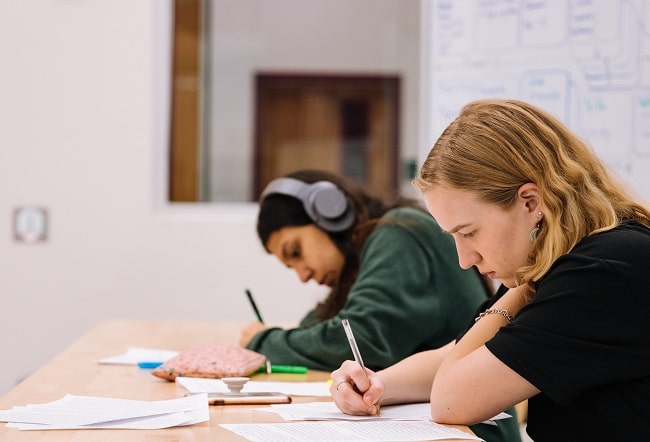
Writing is one of the most dreaded in-class activities that students encounter.
The feeling of oncoming doom appears because students have no confidence in their writing skills. They haven’t written a lot; they haven’t read a lot. That’s why, as a teacher, you should come up with class activities for developing writing skills in class and help students become more confident and creative in expressing their thoughts in writing.
5 Excellent Class Activities for Developing Writing Skills
Encourage students to practice writing daily, read books and pieces of writing to eliminate fears, develop a unique style and tone, and find a literary genre they like. Act as a writing coach to give constructive criticism and guidance, and encourage them to write something every day. These are general guidelines, but specific class activities can help students excel.

1. Journal Journeys: Discovering the Writer Within
Journaling isn’t just about jotting down daily happenings. It’s a transformative tool that opens a dialogue between the writer and their inner world. Through consistent journaling, students can reflect, navigate their emotions, and unlock their creative potential.
Why Journal?:
- Personal Growth: Capture thoughts, moods, and personal evolutions.
- Boost Memory: Handwriting can reinforce memory and understanding.
- Enhance Creativity: Dive into a judgment-free zone to explore novel ideas.
Step-by-Step Guide to Effective Journaling:
- Step 1: Choose Your Medium: Whether it’s a classic notebook, a digital app, or even voice memos, select what resonates with you.
- Step 2: Set Aside Dedicated Time: Aim for a consistent daily slot, even if it’s just 10 minutes.
- Step 3: Find Your Quiet Corner: Seek a peaceful spot free from distractions.
- Step 4: Just Start Writing: Don’t overanalyze; let your thoughts naturally spill onto the page.
- Step 5: Reflect and Review: Dedicate time weekly to review past entries. It’s fascinating what patterns and insights emerge.
Sample Prompts to Kickstart Your Journaling Journey:
- What challenged you today, and why did it stand out?
- Recount a moment today that made you beam with pride.
- Document a fresh learning or insight from today.
- If gifted with any superpower for a day, which would you choose and why?
Recommended Resources:
- Books: Dive into “The Artist’s Way” by Julia Cameron for deeper insights into the power of journaling.
- Apps: For those inclined to digital journaling, explore options like Day One, Penzu, or Journey.
Expert Tip: “Your journal is your haven. There’s no room for judgment here. Celebrate the process of self-expression and self-discovery.” – Jane Doe, Educational Psychologist.
2. Essays Unearthed: Structuring Thoughts into Powerful Prose
Crafting a compelling essay isn’t just about cobbling together words. It’s the art of weaving thoughts, structuring arguments, and engaging the reader in a logical journey. Of course, if students have some difficulties and need help with writing an essay, they can always use the writing help service. Professional authors will complete all tasks and let them save time. But essay development shouldn’t be easy because students won’t learn to write a new essay on their own.
Why Essays?:
- Structured Thought: Learn to organize ideas systematically.
- Persuasive Skills: Convince readers with well-framed arguments.
- Research and Analysis: Delve deep into subjects, analyze various perspectives, and draw informed conclusions.
Blueprint for Crafting a Stellar Essay:
- Step 1: Brainstorming Session: Start with a flurry of ideas. Jot down everything related to the topic.
- Step 2: Essay Outline: Organize the chaos. Draft a basic structure with an introduction, body paragraphs, and a conclusion.
- Step 3: Research: Dive into trusted sources to gather evidence, quotes, and data to fortify your claims.
- Step 4: Drafting: With research at hand, write the first version of your essay.
- Step 5: Editing and Polishing: Refine the draft. Check for coherence, grammar, and clarity.
Sample Essay Topics to Get the Ball Rolling:
- The Impact of Social Media on Modern Society.
- Climate Change: Myths vs. Realities.
- The Evolution of Feminism and its Contemporary Relevance.
- The Influence of Artificial Intelligence on Employment Trends.
Recommended Resources:
- Books: “They Say/I Say”: The Moves That Matter in Academic Writing by Gerald Graff and Cathy Birkenstein.
- Websites: Purdue OWL for comprehensive writing guidelines and citation help.
Expert Tip: “The most potent essays aren’t those with flamboyant vocabulary but ones that resonate with readers through genuine arguments and authenticity.” – Dr. John Smith, Professor of Literature.

3. Story Starters: Sparking Creativity with Guided Beginnings
Diving into the realm of fiction becomes less daunting when there’s a starting point. Story prompts provide that initial nudge, letting imagination take over the rest.
The Power of Prompts:
- Creative Catalyst: Jump-start the storytelling engine.
- Skill Refinement: Practice character development, plot twists, and scene settings.
- Overcoming Writer’s Block: A way out when stuck or uninspired.
The Path to Crafting an Engaging Short Story:
- Step 1: Choose a Prompt: Start with a scenario, question, or dialogue that intrigues you.
- Step 2: Visualize the World: Create the setting. Is it a dystopian future? A historical era? A dreamlike dimension?
- Step 3: Craft Your Characters: Introduce protagonists, antagonists, and side characters. Dive into their motivations, strengths, and flaws.
- Step 4: Develop a Conflict: Every story thrives on conflict. It could be internal, external, or even philosophical.
- Step 5: Reach a Resolution: Conclude your tale. It doesn’t always need to be a ‘happily ever after’, but it should be satisfying for the reader.
Sample Prompts to Unleash the Storyteller Within:
- A mysterious letter arrives, dated 50 years into the future.
- At the stroke of midnight, all mirrors start reflecting a parallel universe.
- “Why is there a dragon in your garage?” she asked, not as surprised as one might expect.
- The first memory he could recall was his birth, and with it, an unsettling message.
Recommended Tools and Resources:
- Books: “The Amazing Story Generator” by Jay Sacher for a mix-and-match approach to story prompts.
- Websites: Check out Reedsy’s writing prompts section for a plethora of intriguing ideas.
Words of Wisdom: “A prompt is merely a stepping stone. Where you take the story, how deep you dive into its realms, is entirely up to your imagination.” – Lila Gray, Award-Winning Fiction Author.
4. Freewriting: Unleashing the Unfiltered Mind
Freewriting is all about letting the mind roam free. No judgments, no backspaces, just pure, uninhibited expression.
Why Freewriting?:
- Stream of Consciousness: Capture thoughts in their rawest form.
- Overcoming Perfectionism: Learn to let go and embrace the imperfections.
- Warming Up: It’s a mental stretch before diving into structured writing.
Steps to Effective Freewriting:
- Step 1: Set a Timer: Whether it’s 5 minutes or 30, this creates a sense of purpose.
- Step 2: Choose a Medium: Pen and paper or digital, whatever feels more comfortable.
- Step 3: Write Non-Stop: Don’t pause to edit or judge, keep the pen (or keys) moving.
- Step 4: Review and Reflect: After the session, revisit what you wrote. Find themes, ideas, or phrases that stand out.
- Step 5: Repeat: Make freewriting a regular practice. The more you do it, the more you’ll discover about your writing style and thought process.
Sample Starting Points to Kick Off Your Session:
- The first sound I heard this morning was…
- If I could step into any painting, I’d choose…
- What if we all had a personal narrator?
- The scent of rain always reminds me of…
Tools to Enhance Your Freewriting Experience:
- Apps: “OmmWriter” offers a serene writing environment, free from distractions.
- Journals: Consider getting a dedicated freewriting journal to chronicle your daily musings.
Pro Tip: “Freewriting isn’t about producing a masterpiece. It’s a journey into the depths of one’s mind, an exploration of thoughts and emotions.” – Maya Foster, Creative Writing Instructor.

5. News Reporting: Cultivating Analytical Minds and Expressive Writers
Transforming classroom discourse into a newsroom can be an engaging way to foster research skills, critical thinking, and coherent expression.
The Charm of News Reporting:
- Real-world Relevance: Connects classroom learning to current events.
- Critical Analysis: Encourages students to dissect, validate, and interpret news.
- Confidence Boost: Presenting news in class hones public speaking and expression.
Steps to Effective News Reporting in Class:
- Step 1: Source Selection: Encourage students to bring in newspapers or select from trusted online news portals.
- Step 2: Story Picking: Let students choose a news item they feel passionate about or intrigued by.
- Step 3: Research Deep Dive: Ask students to investigate further, going beyond the initial news article for varied perspectives.
- Step 4: Craft the Report: Students write their version, adding their insights, opinions, and understanding.
- Step 5: Presentation Time: Just like a newscaster, students present their news story in front of the class, fostering interaction and discussion.
Suggested News Categories to Explore:
- World Affairs: Global events that shape international relations.
- Local News: Stories that are closer to home but equally impactful.
- Science & Tech: Breakthroughs, innovations, and their implications.
- Arts & Culture: From movie releases to art exhibitions, there’s a story everywhere.
Resources to Aid News Reporting:
- Websites: BBC Learning English offers “News Report”, an educational program designed for classroom reporting.
- Books: “News Writing and Reporting: The Complete Guide for Today’s Journalist” by Chip Scanlan provides invaluable insights.
Remember: “News isn’t just about presenting facts. It’s about understanding their implications, questioning the narratives, and fostering informed discussions.” – Neil Harrison, Journalist and educator.
Conclusion
The art of writing requires a wide range of skills. With the right class activities for developing writing skills, your students may be able to unlock their full potential as excellent writers. Students should be able to convey confidence and respect to their audience and tell a great story. A writer who can make an impression with the right tone and turn of phrase will do well in life, and your pupils deserve this. Next up, you may want to explore a quick guide to crypto investing for college students.
Hey there, welcome to my blog! I'm a full-time entrepreneur building two companies, a digital marketer, and a content creator with 10+ years of experience. I started RafalReyzer.com to provide you with great tools and strategies you can use to become a proficient digital marketer and achieve freedom through online creativity. My site is a one-stop shop for digital marketers, and content enthusiasts who want to be independent, earn more money, and create beautiful things. Explore my journey here, and don't forget to get in touch if you need help with digital marketing.

